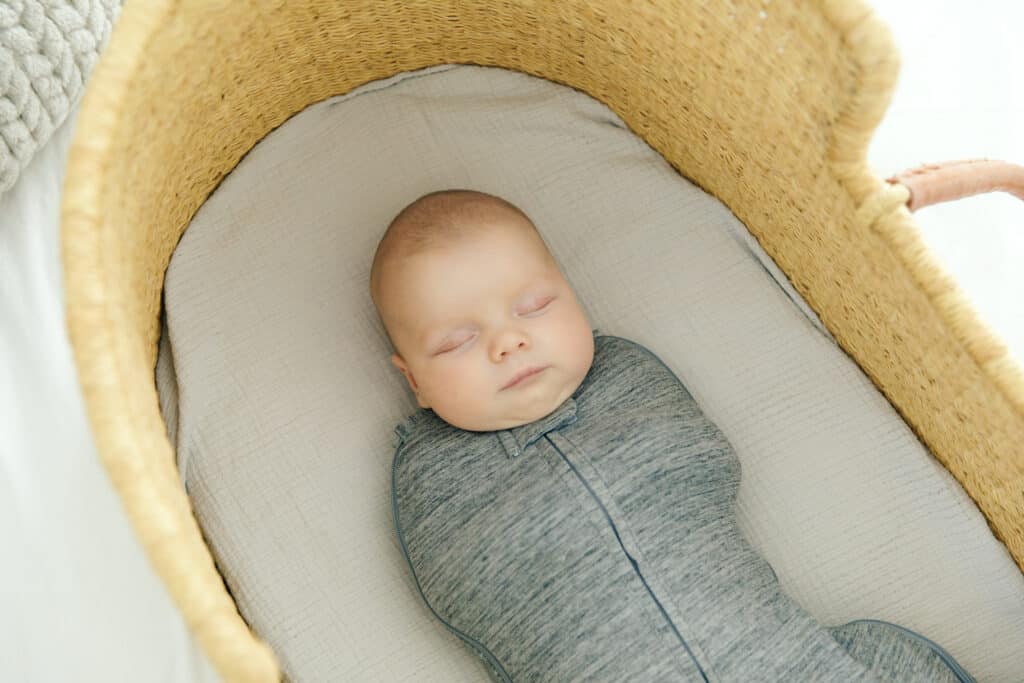
When you bring your new little bundle home from the hospital, it can seem like all they do is sleep and eat. As a first-time parent, you may look over at your newborn as they’re in dreamland and wonder, “Have they been asleep for too long?”
It’s important to remember that newborn babies don’t adhere to any specific sleep schedule – their circadian rhythm (sleep cycle based on day and night) hasn’t developed yet.
“Usually, the newborn is simply sleeping when they get tired, which is part of the body’s self-regulating or homeostatic response. This is a major reason why newborn and infant sleep patterns seem so irregular compared to adults,” explains BC Children’s Hospital.
So, how long should newborn babies sleep, and is there ever a situation where you should wake them up?
How Long Should Newborns Sleep?
Newborn babies can sleep around 16 to 18 hours within a 24-hour period! This is broken up for feedings at least every three hours. Newborns have tiny stomachs, so they have to feed often to keep up with the necessary calorie intake. And, it’s completely normal for your newborn to fall asleep at the breast or while feeding. This is called the feeding to sleep cycle, and as your baby grows you can wean them off this pattern.
Newborn babies sleep so much because coming into this world is exhausting, and they’re growing at an exponential rate – to facilitate this growth, they need their rest.
If your baby sleeps longer than usual and isn’t waking up on time for feedings, they could be going through a developmental leap so they need the extra z’s. This can also happen if your baby had a particularly overstimulating day. However, this shouldn’t be the norm.
Should You Ever Wake Up A Sleeping Baby?
As we’ve established, newborn babies need to sleep a lot. But, they also need calories to grow. “Even though it can be tempting to let an extra sleepy newborn keep snoozing, if your baby isn’t waking on her own to eat often enough, you’ll need to rouse her,” says What To Expect.
For the first two to three weeks of your newborn’s life, it’s important to keep track of their sleeping patterns and wake them up if they don’t open their eyes for feeds, especially if you’re a breastfeeding mama. There are two reasons for this:
- Calories
Newborn breastfed babies shouldn’t go longer than two to four hours without being fed (formula fed babies three to four hours). Little ones need their calories so that they can gain much needed weight. Once your baby is gaining a healthy amount of weight and is on track with development, your pediatrician will likely give you the go ahead to stop waking them up for feeds.
- Establishing Your Milk Supply
If you let your baby sleep during their feeding times, you could experience a decrease in milk supply. Remember, breastmilk works on a supply and demand basis – if your milk isn’t released it signals to your body not to make as much. Here are 5 ways to wake up your newborn for feedings.

When To Start Putting Your Baby On A Sleep Schedule
As newborns grow into infants, they begin to develop their circadian rhythm and can be introduced to a schedule. The length they sleep will increase, as will their wake windows.
When your baby is around two to three months, they’ll start sleeping for five to six hour stretches.
“By the age of 6 months, 90% of babies sleep through the night. Even then, though, there is a significant variation from baby to baby,” says Medical News Today.
However, even a newborn can benefit from a routine, as their brains are learning associations and establishing patterns.
A newborn can benefit from a nighttime routine that includes:
- Natural Light
Go outside with your baby. The natural light and fresh air can be calming and help your baby establish an internal clock.
- A Bath With Lavender Bath Soap
While a bath is relaxing, it can still be a little too stimulating for a newborn, so don’t make it the last thing they do before bed. You can further promote a feeling of calm with lavender products. Here are my favorites.
- Boring Nighttime Feeds
Any feeds after you put them in their crib for night are nighttime feeds, so treat them differently to daytime feeds. You can do this by making them boring! Feed them, change their diaper if needed, and put them down again. Avoid stimulation by keeping the lights low and ensuring a quiet environment. As your baby grows and they feed less during the night, you may experience a drop in breast milk supply – here are six ways to stop this from happening.
I go further into feedings and how it affects baby’s sleep in my free guide. Whether you’re pregnant or postpartum, I’ve got you covered with the essential truths of birth, babies, and breastfeeding. Click here to get it.



